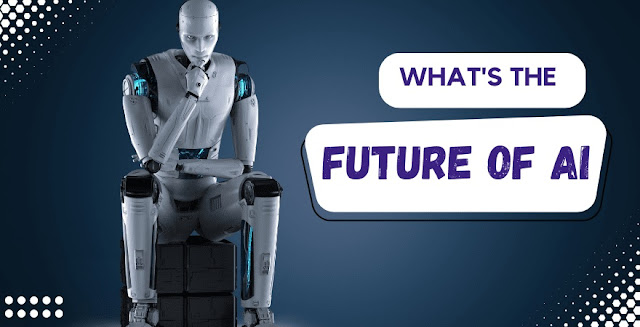Exploring the Promising Horizons: The Future of AI and Its Implications
Artificial Intelligence (AI) is the engine that's propelling us into an era of unprecedented possibilities. As we venture into the future, AI's potential applications, along with the ethical and practical challenges it poses, come into focus. Join us on this journey to explore the dazzling promise of AI and the profound implications it carries.
Introduction
In an age where technology reigns supreme, Artificial Intelligence stands as one of the most transformative forces. It has moved beyond being a mere buzzword to becoming an integral part of our daily lives. Yet, what lies ahead in the realm of AI is even more astounding. This blog will delve into the exciting horizons of AI, from the extraordinary applications it offers to the complex challenges it presents.
Promising Applications of AI in the Future
1. Healthcare
AI's influence in healthcare is poised to be revolutionary. Picture a future where AI-driven diagnostic tools can pinpoint diseases with unparalleled precision, aiding in early detection and prognosis. According to a report by IBM Watson Health, AI is set to enhance patient care by minimizing diagnostic errors and accelerating drug discovery.
2. Autonomous Vehicles
The dream of self-driving vehicles is rapidly becoming a reality, thanks to AI. AI algorithms enable vehicles to navigate intricate road networks, detect obstacles, and prevent accidents. Research published in the International Journal of Engineering Research & Technology suggests that autonomous vehicles could potentially lead to a significant reduction in traffic fatalities.
3. Personalized Education
Education is on the cusp of a transformation driven by AI. AI-driven educational platforms will tailor learning experiences to individual needs, learning styles, and paces. According to EdTech Review, this personalized approach holds the potential to democratize quality education, making it accessible to learners worldwide.
4. Climate Change Mitigation
AI is a powerful ally in the fight against climate change. By analyzing vast datasets, AI can optimize energy consumption, predict environmental disasters, and foster sustainable solutions. A study published in Nature highlights AI's potential role in achieving environmental sustainability.
Challenges and Ethical Concerns
While AI offers a horizon filled with promise, it is not without its share of challenges and ethical dilemmas.
1. Bias and Fairness
AI systems can inherit biases present in their training data, resulting in unfair or discriminatory outcomes. Addressing bias in AI decision-making is a complex task. MIT Technology Review delves into the intricacies of bias mitigation in AI systems.
2. Job Displacement
The rise of AI and automation raises concerns about job displacement. Many jobs that involve routine tasks could be automated, potentially leading to significant workforce changes. The World Economic Forum highlights the need for workforce adaptation in the AI era.
3. Privacy
The vast amount of data processed by AI systems raises profound privacy concerns. Striking a balance between data utilization and protection is essential. The Pew Research Center examines public perceptions of privacy in a world driven by AI.
Impact on the Workforce
AI is poised to redefine work as we know it. While it may automate routine tasks, it can also empower workers by enhancing their capabilities. Collaboration between humans and AI, where machines handle repetitive duties, allows humans to focus on creativity and complex problem-solving. According to a McKinsey Global Institute report, AI could free up substantial time for human workers.
Collaboration between Humans and AI
The future of AI isn't about replacing humans but amplifying their abilities. AI can assist doctors in diagnosing diseases, aid lawyers in analyzing legal documents, and empower architects to design sustainable structures. Harvard Business Review explores how humans and AI can work together harmoniously.
AI and Society
AI's influence extends beyond industries and workplaces. It has the potential to reshape how we live, interact, and govern ourselves. AI can optimize city planning, allocate resources efficiently, and enhance public safety. However, it also raises complex questions about civil liberties and societal norms. The Brookings Institution delves into the societal implications of AI.
The Role of AI Ethics and Regulation
As AI continues to advance, ethical guidelines and regulations become paramount. Governments, organizations, and researchers must collaborate to establish standards that ensure the responsible development and deployment of AI technologies. Organizations like the Institute of Electrical and Electronics Engineers (IEEE) are actively shaping AI ethics and standards.
Future Trends and Predictions
While predicting the exact path of AI's evolution is challenging, several trends are poised to define its future:
- AI for Sustainability: AI will play a pivotal role in addressing environmental challenges by optimizing resource usage and promoting sustainability.
- AI in Personalized Medicine: Healthcare will see tailored solutions based on individual genetics and lifestyles, revolutionizing patient care.
- AI-powered Creativity: AI-generated art, music, and content will gain acceptance, offering new avenues for artistic expression.
- AI in Governance: Governments will harness AI to enhance decision-making and public services, while grappling with regulatory complexities.
Conclusion
The future of AI is a thrilling odyssey into the unknown. It promises to revolutionize industries, enrich our lives, and empower individuals. However, we must tread thoughtfully, addressing ethical concerns and regulatory hurdles. By fostering collaboration between humans and AI and embracing responsible AI development, we can unlock the boundless potential of this transformative technology. The future is not just about machines; it's about how we, as a society, choose to shape and embrace this promising horizon. The possibilities are endless, and the future is decidedly AI-driven.

